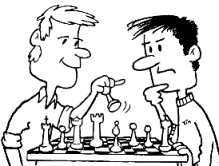Chess blog for latest chess news and chess trivia (c) Alexandra Kosteniuk, 2011
Hello everyone,
This was a neat chess interview we found of Wayne Pressnall, 76, of North Platte, who is the highest-rated postal chess player in Nebraska, having achieved a master's rating in the USCF! He began playing chess at age 17 when he was a projectionist at the local movie theater in Wymore and needed to pass time between changeovers.
He won a couple of college championships but he found little competition when he started his teaching career in 1959 at Fullerton. "With nothing much else to do there, I found a copy of Chess Review on a newsstand somewhere and found that I could enter a postal tournament."
He entered a Class B tourney and won a section, helped by an opponent who sent his first move for game and an "If" move for game two, playing g6 and Bg7 to any two moves by Wayne.
"I learned then and there that there is no way to forgive an opponent anything at postal chess. There are no take backs or give backs in the rules."
He said he learned about the dark side to postal chess: players who, behind in their position, would just stop sending moves or resignations. Some would sign up for games and never make a move.
"But the most frustrating thing was that the postal director hated to forfeit anybody for gross lateness. With these annoyances, I thought of quitting postal chess several times."
He adds the games were fun and the correspondence between players was also fun. He quit postal chess for a while when he received an NSF fellowship at the University of Pennsylvania where he earned his M.S. His wife, Gloria, also delivered their second child.
"I decided the busy life was not conducive to postal chess. So I quit."
He adds the games were fun and the correspondence between players was also fun. He quit postal chess for a while when he received an NSF fellowship at the University of Pennsylvania where he earned his M.S. His wife, Gloria, also delivered their second child.
"I decided the busy life was not conducive to postal chess. So I quit."

By 1967, he had taught three years at Peru St. College Campus H.S. He was also helping raise their two children, Gretchen and Will. He read in a paper that the Campus School would be closed so he landed a position teaching physics, chemistry, and sometimes freshman science and algebra at Schuyler. He took up postal chess again.
He was inspired to play over the board (OTB) chess reading Chess Review, which mentioned the Midwest Open in Lincoln.
"I thought on the basis of my experiences so far, that I would just go down and win the $100 first prize. I was 32 then. One Bud Narveson showed me the error in my thinking in the very first round." He did go 3-2 and won the unrated trophy and received a class B rating. It was then he discovered the difference between correspondence and OTB chess.
"In postal, one can be analytical and try out one's ideas before sending a move. In OTB, to try something is to make blunders and I was very prone to that. In fact, I believe that one out of every 40 OTB moves I made was a blunder." He won the OTB state championship in 1995. He stopped playing OTB about 1998. He saw his rating plunge from 2025 to a floor of 1800.
"My main talent had become falling asleep during the games." His best postal finish was in the 1978 Golden Knights where he finished a couple of points behind the winner, raising his rating to 16th in the country.
He said he has about 20 games going at any one time. "The hardest part of keeping up with them is the amount of traveling Gloria and I do."
He said he averages less that two days reflection time while the rules permit three days. "I don't have as much problem with falling asleep during planning a move. I can wake up and not have to move while groggy. So CC is for my present condition as a 76-year-old with conditions."
He said he struggles with notation errors mostly now. "I have lost my master's rating and failed to place well in the Golden Knights just on notation errors."
He said a computer database that he bought to record moves is helping some. But the compter is also making the game tougher.
"Nobody makes simple errors anymore. I suspect that this has something to do with the various chess playing engines out there. But there is no way to know that. Many players will admit having an opening database, but few will tell how else they use their computers. A few would like to change your CC game over to a computer game, but I always refuse. The computer games always seem to put pressure on one to move at a faster pace than my schedule permits and I always have projects that tie up my computer anyway. So normally I play only by postcard."
Among his funny experiences in CC was the time a lower-rated player caught him making a hasty move before Wayne left town on a trip, resulting in Wayne being a piece down.
"I decided to make another move anyway and my game improved and kept on improving move by move until it was drawn and then it was won. It turned out he had played the game without his extra piece on his record board."
It's all part of the wonderful game of chess.
"CC can take some strange turns like OTB and as it is chess it is still interesting and often fun."
Also see her personal blog at

No comments:
Post a Comment
Note: Only a member of this blog may post a comment.